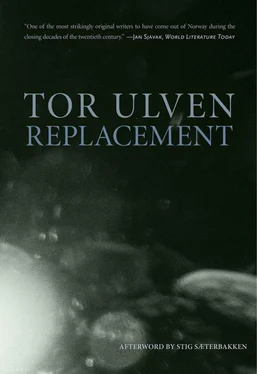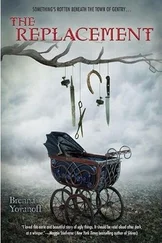Tor Ulven - Replacement
Здесь есть возможность читать онлайн «Tor Ulven - Replacement» весь текст электронной книги совершенно бесплатно (целиком полную версию без сокращений). В некоторых случаях можно слушать аудио, скачать через торрент в формате fb2 и присутствует краткое содержание. Год выпуска: 2012, Издательство: Dalkey Archive Press, Жанр: Современная проза, на английском языке. Описание произведения, (предисловие) а так же отзывы посетителей доступны на портале библиотеки ЛибКат.
- Название:Replacement
- Автор:
- Издательство:Dalkey Archive Press
- Жанр:
- Год:2012
- ISBN:нет данных
- Рейтинг книги:3 / 5. Голосов: 1
-
Избранное:Добавить в избранное
- Отзывы:
-
Ваша оценка:
- 60
- 1
- 2
- 3
- 4
- 5
Replacement: краткое содержание, описание и аннотация
Предлагаем к чтению аннотацию, описание, краткое содержание или предисловие (зависит от того, что написал сам автор книги «Replacement»). Если вы не нашли необходимую информацию о книге — напишите в комментариях, мы постараемся отыскать её.
Replacement — читать онлайн бесплатно полную книгу (весь текст) целиком
Ниже представлен текст книги, разбитый по страницам. Система сохранения места последней прочитанной страницы, позволяет с удобством читать онлайн бесплатно книгу «Replacement», без необходимости каждый раз заново искать на чём Вы остановились. Поставьте закладку, и сможете в любой момент перейти на страницу, на которой закончили чтение.
Интервал:
Закладка:
The gaps between the vertebrae resemble laughing mouths. You stuff this black sheet back into the envelope, and the others too, reach up, stroke your chin, notice you need a shave, glance at the clock, glance at your crutch, glance back at the clock, use your crutch to twist yourself up off your chair (the hip arthrodesis worked like a charm; opting for a pain-free existence with limited movement over a pain-filled existence with unlimited movement was definitely the right choice, you think), and hobble toward the window. The day is regaining its equilibrium, it’s growing lighter out. To the north, a bluish-black wall of thick cloud forms a swift, traveling version of night; you can still see flashes of lightning, though they no longer come in blinding bursts, but only as thin, white fissures against the dark sky, and the crash is delayed by a few seconds now; practically speaking, the light flares up in tandem with the rasping sound, a striking sound, then settles back down onto the horizon, like a pennant snapping on a speedboat’s stern (where the match is the flagpole), flaring up (for perhaps a hundredth of a second), then retreating back down and finally going out, leaving behind a thin, whitish trail of smoke that seems to vanish before you’ve seen it: you stand with a burnt match (number two) between your fingers, and her cigarette is still unlit.
Something in English, something she’d half-laughed, half-hummed, probably something about fire, you think, something from a song that you, nearly fifty-six years old now, don’t know or can’t remember (you wonder how much younger than you she actually is), and you’re glad the darkness hides your chagrin, at least until you do what you’re supposed to be doing, that is, striking another match (at which point you’ll be revealed in its light). You take extra precautions this time: you fish the match out of the box and place it between the thumb and forefinger of your right hand (you’re left-handed), keeping it as close to your hand as possible, while you strike the head repeatedly against the box (which says: “A penny saved is a penny earned”) until you’ve generated enough friction to set the sulfur ablaze, at which point flame blossoms between your cupped hands, brightening their pink skin and causing light to slip out between your fingers, reminding you of a snow lantern; the flame flickers dangerously, threatening to go out again, so you carefully lift it up toward her lips, like you’d lift a spoonful of medicine, while she bends down, meeting you halfway, and because she’s holding her hair away from the fire it’s not her hair that brushes your hand when cigarette meets flame, but instead one long, heavy silver earring, which bumps against your skin in a curtailed pendular motion that resumes the moment she straightens up again, thanking you with what might be a touch of irony in her voice. She doesn’t smoke, you think. You also manage to light your own cigarette before the wind puts out the match again.
Nonetheless, you think, suddenly cheerful (and still a little tipsy), or rather: you feel, because the thought surfaces (and disappears) so quickly you don’t have the chance to examine it in detail (leaving it like a map with no place names): the earring is totally foreign to you, and the fact that it touched you (instead of her hair, or, better yet, her hand, like you might’ve hoped) means that an alien world has reached out and touched you, because the earring she chose for reasons unknown — you don’t think much of it — but, anyway, whatever reason she had for choosing that particular earring is based on her personal taste, which is based in turn on underlying parts of her personality (you assume she likes attention, perhaps she’s got a flair for the dramatic), which are based in turn on what you might call her inner self, which leads us all the way back to her so-called irrational needs and desires, vulnerabilities, fears, weak points, aggressions, which in turn are based on an extraordinarily complex constellation of collective determinants, the mosquito swarm of major and minor fates who together decree what a person will become, who together brought her to the point of choosing this particular earring; in any case, whether or not you take all that pretentious bullshit seriously, there was still something, you think, that made you shudder at the earring’s touch, namely, the overwhelming sense of foreignness (or, more precisely, the sense of a seductive, feminine foreignness; if she’d been ugly, you would’ve shuddered in distaste) surrounding her, the sense that she was (and still is now, a few seconds later) a strange woman ( she is also a stranger to you), but chances are good that she’ll soon be a woman you’ll know better (although you’d prefer even her neck to this woman’s breasts); she asks why you’re laughing, but instead of blurting out this unflattering thought you say It’s nothing, but she insists, It makes no sense to laugh about nothing, every joke’s got a grain of truth in it, you could’ve been laughing at me, and you say Really, there is no joke, that’s the honest truth, and shifting your cigarette to your other hand, you put your arm around her shoulders. She doesn’t say a word, she just laughs.
A public space paved in flagstones, bordered by public flowers that are just starting to drop their petals, at least that’s what it looks like in the frugal gleam of the public lighting, the blossoms are half-rotten and shriveled. You’ve more or less smoked your cigarettes down to the filter, and she tosses hers onto the flagstones without bothering to stamp it out (when it hits the ground, it sparks and rolls a few centimeters before it remains lying in a fugue); you toss yours onto the flagstones too, and stamp it out, and then also stamp out hers. You’ve come to a halt next to a lamppost (which has a paper delivery cart with big rubber tires chained to it) for some reason, and you seize this opportunity to kiss her; at first she puts up a half-hearted resistance, so you only get a corner of her mouth, but second time’s the charm, more or less (and while you kiss her, you forget how you imagined what kissing her would be like), and as your tongue explores her mouth like a dentist’s finger, the image of her face (from the second before the kiss) disappears, but the afterimage, or rather your memory of it, still plays before your mental eye, like there’s a projector located somewhere in the labyrinthine structure of your brain: her sun-browned face, which the fresh air has made glow, forms a strange contrast to her elegant, narrow (undoubtedly plucked) eyebrows, (one is marred by a small wart, and you can’t believe she’s never had it removed), her heavy eyelids, seemingly echoed by the bags under her eyes, or no, as though the pupils are stones someone cast into a pond, sending out rings: first the irises, then the eyelashes (upper and lower), then the eyelids and the skin right below the eyes, then the eyebrows and the bags, and, finally, far away from the impact site, faint, dying away, the bow-shaped wrinkles above her eyebrows and along her cheekbones; you too could’ve been a stone, and someone could’ve cast you into that water, and you would’ve been lost for all time.
No. Not in her eyes, the eyes that are still closed when you draw back your face after you’ve decided that the kiss, or rather the kisses, have gone on long enough, the eyes that just now are slowly opening, blinking up at you, as though she’s waking up from a nap, while a (halfway tender, halfway ironic) smile breaks out across her face, starting with her mouth (bringing to mind ripples in water again), and it’s right then, as she’s standing there smiling at you, that she begins to age before your eyes, that her face wrinkles up like an empty bag, or better yet, like the surface of bread that’s been left too long in the bag, it cracks like the veneer of an old painting, the fine thread of wrinkles appear from nowhere, you think, or no, not from nowhere, from inside her, they were lying in wait, as if they’d been there all along, you think, as if they’d been inside her since she was born, although they were hidden for the first few years, but with time they (literally) begin to seep out, to grow clearer and clearer, creek beds being cut soundlessly into the surface of her face by an endless spring flowing right beneath her skin, as if time were a perpetual trickle of groundwater, or rather as if the old face with its thousand wrinkles had been there from the beginning, complete down to the smallest detail, as if it had simply been hidden beneath the deceptive mask of youth, which eventually falls away, yes, as if the length of time between a newborn’s chubby, wrinkled face and an old person’s sunken, wrinkled face (the expiration period: a single life span) were a negligible quantity, a meaningless hiatus, a forgotten interlude before the next newborn face appears, only to dissolve with incredible speed into a new old face (you can picture how the wrinkles and furrows will spread all at once, like cracks appearing on a huge rock a thousandth of a second after the dynamite has been detonated, but before the rock comes crashing down), and so on, at a relentless pace, until finally you don’t know who came first, the old person or the newborn, you don’t know if it’s a newborn face or an old face you’re seeing, or if just maybe they can emerge both at once.
Читать дальшеИнтервал:
Закладка:
Похожие книги на «Replacement»
Представляем Вашему вниманию похожие книги на «Replacement» списком для выбора. Мы отобрали схожую по названию и смыслу литературу в надежде предоставить читателям больше вариантов отыскать новые, интересные, ещё непрочитанные произведения.
Обсуждение, отзывы о книге «Replacement» и просто собственные мнения читателей. Оставьте ваши комментарии, напишите, что Вы думаете о произведении, его смысле или главных героях. Укажите что конкретно понравилось, а что нет, и почему Вы так считаете.












